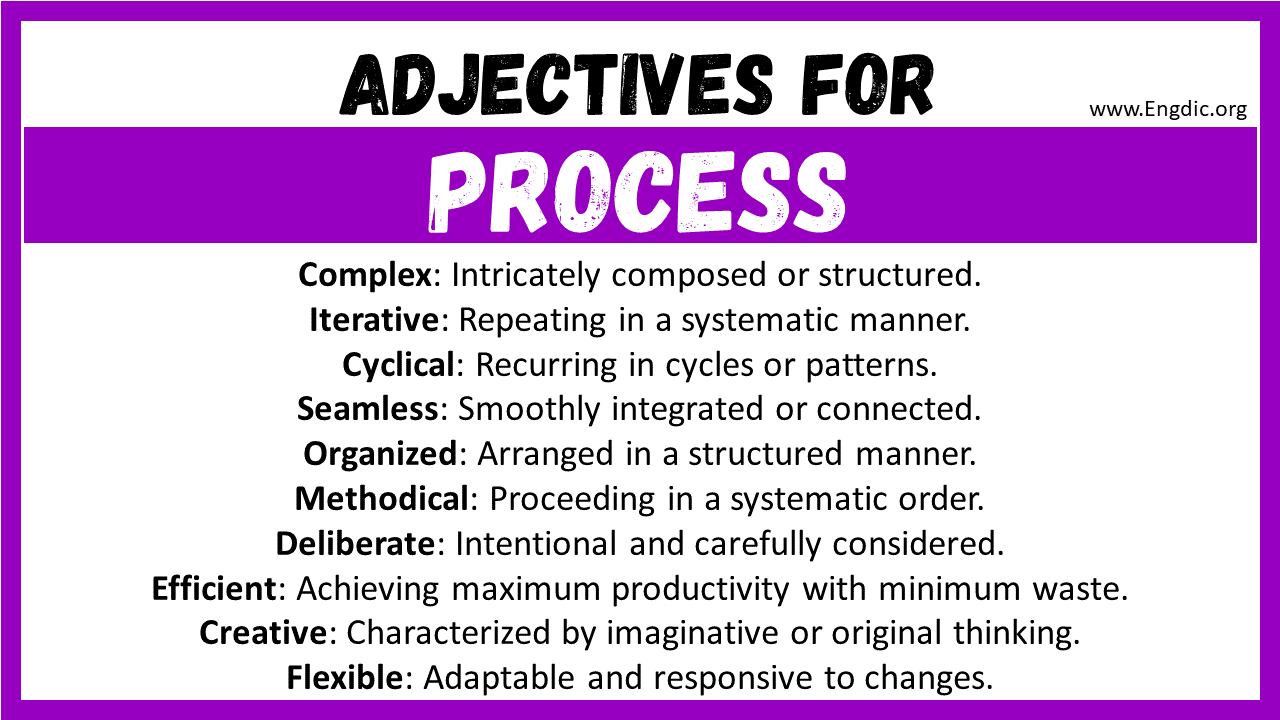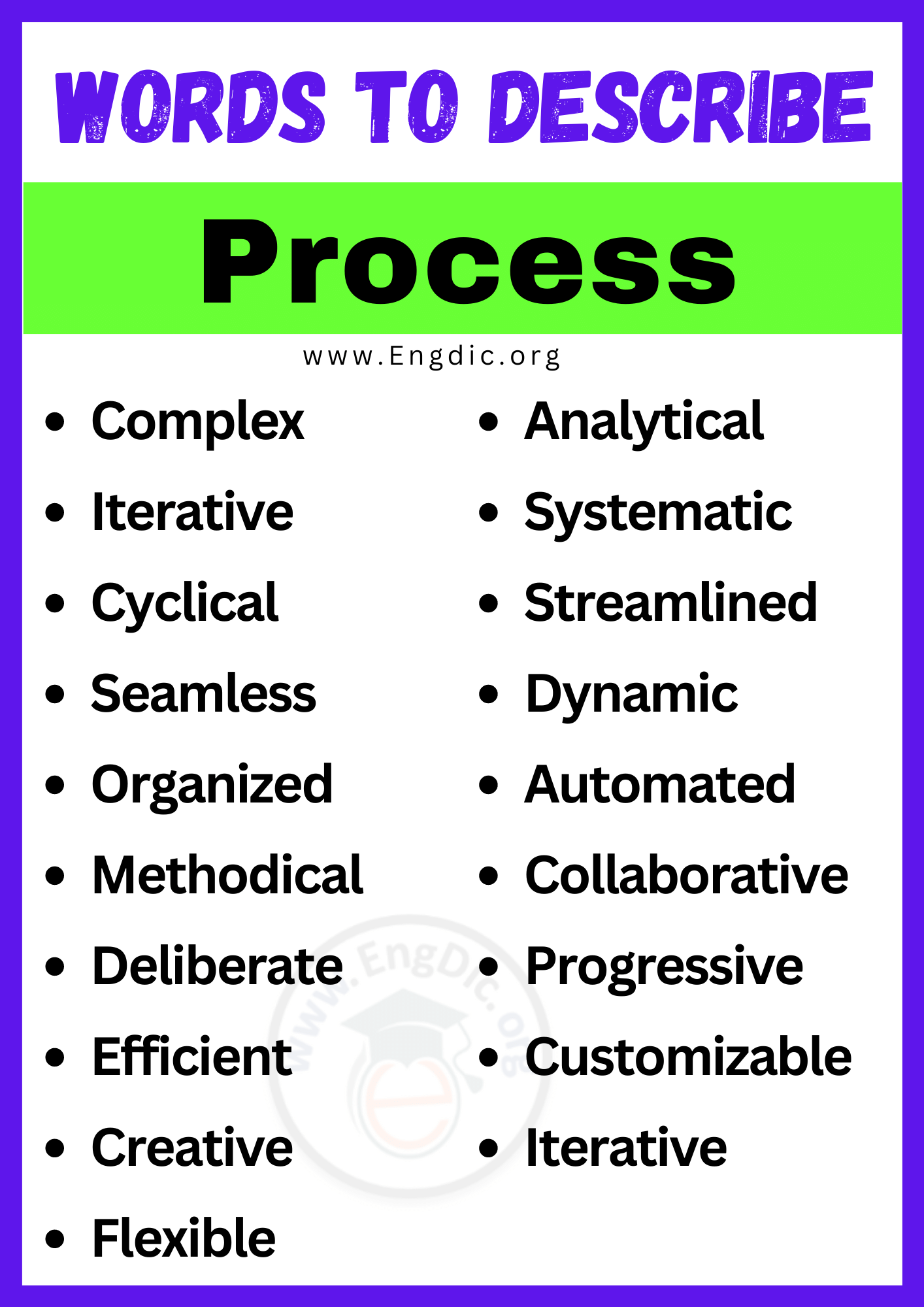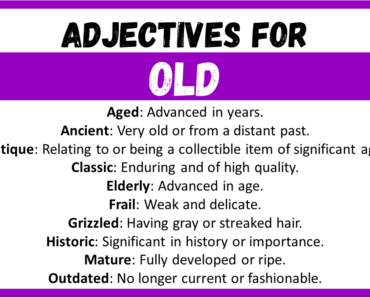Understanding the concept of “process” is crucial in various aspects of life, be it in business, science, or daily routines. A process refers to a series of steps or actions undertaken to achieve a specific goal. In this blog post, we delve into the realm of “words to describe the process,” exploring a diverse range of terminologies that elucidate the various stages, methods, and intricacies involved in accomplishing tasks. By harnessing these descriptive words, we can enhance our communication and comprehension of processes, fostering greater efficiency and clarity in our endeavors.
Adjectives for Process
Here are the 20 Most Popular adjectives for the process:
- Complex
- Iterative
- Cyclical
- Seamless
- Organized
- Methodical
- Deliberate
- Efficient
- Creative
- Flexible
- Analytical
- Systematic
- Streamlined
- Dynamic
- Automated
- Collaborative
- Interdisciplinary
- Progressive
- Customizable
- Iterative
Adjectives for the Recruitment Process:
- Efficient
- Streamlined
- Thorough
- Effective
- Rigorous
- Selective
- Comprehensive
- Targeted
- Systematic
- Inclusive
Adjectives for Process Improvement:
- Innovative
- Continuous
- Productive
- Adaptive
- Proactive
- Incremental
- Collaborative
- Streamlining
- Optimizing
- Dynamic
Adjectives for Due Process:
- Fair
- Impartial
- Legal
- Transparent
- Just
- Equitable
- Procedural
- Timely
- Unbiased
- Proper
Adjectives for the Learning Process:
- Interactive
- Engaging
- Progressive
- Personalized
- Empowering
- Lifelong
- Transformative
- Reflective
- Multifaceted
- Self-directed
Words to Describe Process with Meanings
- Complex: Intricately composed or structured.
- Iterative: Repeating in a systematic manner.
- Cyclical: Recurring in cycles or patterns.
- Seamless: Smoothly integrated or connected.
- Organized: Arranged in a structured manner.
- Methodical: Proceeding in a systematic order.
- Deliberate: Intentional and carefully considered.
- Efficient: Achieving maximum productivity with minimum waste.
- Creative: Characterized by imaginative or original thinking.
- Flexible: Adaptable and responsive to changes.
- Analytical: Involving careful examination and study.
- Systematic: Carried out in a methodical and logical way.
- Streamlined: Simplified and optimized for efficiency.
- Dynamic: Constantly changing or evolving.
- Automated: Operated by machines or technology.
- Collaborative: Involving cooperation and teamwork.
- Interdisciplinary: Involving multiple fields or areas of expertise.
- Progressive: Moving forward or advancing continuously.
- Customizable: Capable of being tailored or adapted.
- Iterative: Repeating in a systematic manner.
Example Sentences for Process Adjectives
- The complex math problem challenged the students.
- Our software undergoes iterative updates regularly.
- Seasons follow a cyclical pattern every year.
- The new software has a seamless user interface.
- The organized event impressed the attendees.
- The scientist conducted a methodical experiment.
- He made a deliberate decision after much thought.
- The factory implemented efficient production methods.
- She presented a creative solution to the problem.
- Being flexible, he adapted to changes quickly.
- The report required analytical data analysis.
- The team followed a systematic approach to research.
- The company introduced a streamlined workflow.
- The business world is constantly dynamic.
- They automated the repetitive tasks automated.
- The project’s success was due to collaborative efforts.
- The research involved interdisciplinary collaboration.
- The company promotes progressive work culture.
- The app is customizable to fit user preferences.
- Iterative feedback helps improve the product.
Explore More Words:
FAQ’s
How to describe the process in writing?
Process writing involves explaining a sequence of steps or actions to accomplish a task or achieve a goal.
What do we call a process?
A process is commonly referred to as a series of actions or steps taken to achieve a specific outcome.
What is a similar process?
A similar process refers to a comparable sequence of steps or actions used to attain a similar result as the original process.








